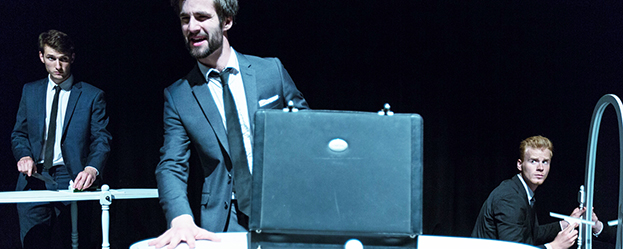This website uses cookies so that we can provide you with the best user experience possible. Cookie information is stored in your browser and performs functions such as recognising you when you return to our website and helping our team to understand which sections of the website you find most interesting and useful.
ED2014 Interviews ED2014 Theatre ED2014 Week2 Edition
Rebecca Hill & Bradley Leech: Women’s stories, men’s voices
By Chris Cooke | Published on Thursday 14 August 2014

Women’s stories, men’s voices. It’s a simple concept, but it creates a powerful piece, challenging society’s perceived gender norms. ‘Travesti’ began with the real-life stories of ten women, discussing the traumatic and the mundane, from sexual assault to unruly body hair. And those stories are now retold by six male characters. We spoke to Rebecca Hill and Bradley Leech, Artistic Directors of Unbound Productions, about the motivation for and impact of the project.
CC: Let’s start at the start, where did the idea come from for Travesti?
RH: It was a growing realisation that there were a number of behaviours that I accepted as being “just what happens”, but I wasn’t sure why. And not only the sexist behaviour of men, those stories you so often hear of women being cat-called or groped, but also the gendered social norms that women themselves follow, to the extent that you never really think about them, things like shaving their legs and wearing make up. It struck me as unusual that these are behaviours and norms we would never accept or expect the other way around.
CC: Where do the stories that are told come from?
RH: After we’d come up with the general concept for the show, we sent out a plea for stories over various social media platforms and had a good response. Some women contacted us saying that they loved the idea but didn’t want to be interviewed, but other women jumped at the chance to tell their stories. In the end we interviewed ten women, a mixture of people we met for the first time through the project, and others we had known for years.
CC: How true to the stories you were told are the stories we hear? Did you employ any dramatic licence?
BL: There is, of course, a necessary dramatic licence that comes just from the process of editing. There is also the dramatic licence in terms of character. Although the cast are playing six characters, the play is made of ten women’s stories, so all of the cast have taken more than one voice to create their one character. The stories, however, are all true. There is no clever editing to make a story more dramatic than it is, they are true stories and the boys perform them with the exact tone, intonation and featuring all the same “ums”, “ahs” and giggles that the women told them to us with.
CC: How do the men in the cast feel about speaking the words of women talking about their personal experiences?
RH: I think they feel it is a great responsibility. They have developed a real love and respect for the women who have shared their stories, and they have spoken at length about wanting to do those stories justice and the women proud.
CC: Do the cast try to adapt the mannerisms of the women whose stories they portray, or do they play the characters very much as if they were male?
BL: The cast are very much men on stage, that’s something we haven’t shied away from. The idea of the piece is to explore the affects of putting women’s voices in men’s mouths, so we have always used their masculinity in the movement direction. They have developed some mannerisms akin to the women we spoke to just from listening to their voices, but the cast did not actually meet the women they were representing before or during rehearsals, because some of the women asked for anonymity.
CC: The show encompasses female experiences both mundane and traumatic. How does it work putting different kinds of stories alongside each other?
RH: It’s an art of balance just like any other play. And although some of the stories may seem mundane, such as shaving body hair or wearing make up, when these stories so unique to women are told by men, they cease to be mundane and actually become fascinating pieces of social observation.
CC: How have audiences responded to the piece? Is it generating the kind of debate that you hoped for?
BL: Audiences have been incredibly positive, which is absolutely fantastic. The debate this piece causes is huge, and we’re so pleased because that is exactly what we hoped for. We’ve had people tweet us saying they’re still talking about the show hours later, and that’s the best we can really hope for.
CC: You previously performed a very short version of the work at the LOST Theatre, and then a longer piece at London’s Etcetera Theatre. How does the Edinburgh production compare?
BL: Well for starters it’s longer! It is most similar to the developing version we performed at the Etcetera, but it delves deeper into the different areas of discussion. We can get to know the characters a bit better and we’ve also been able to introduce other areas of discussion that we previously hadn’t touched upon.
CC: What long-term plans do you have for the show?
RH: We’re currently focused on Edinburgh, but we would love to transfer to London and tour nationally, perhaps even take it to an international audience. We’ve had some really great audiences and some sell-out performances, so hopefully we can keep entertaining and moving people for the rest of the Festival and see what the future holds from there.
‘Travesti’ was performed at the Pleasance Dome at Edinburgh Festival 2014.
LINKS: www.unbound-productions.com






